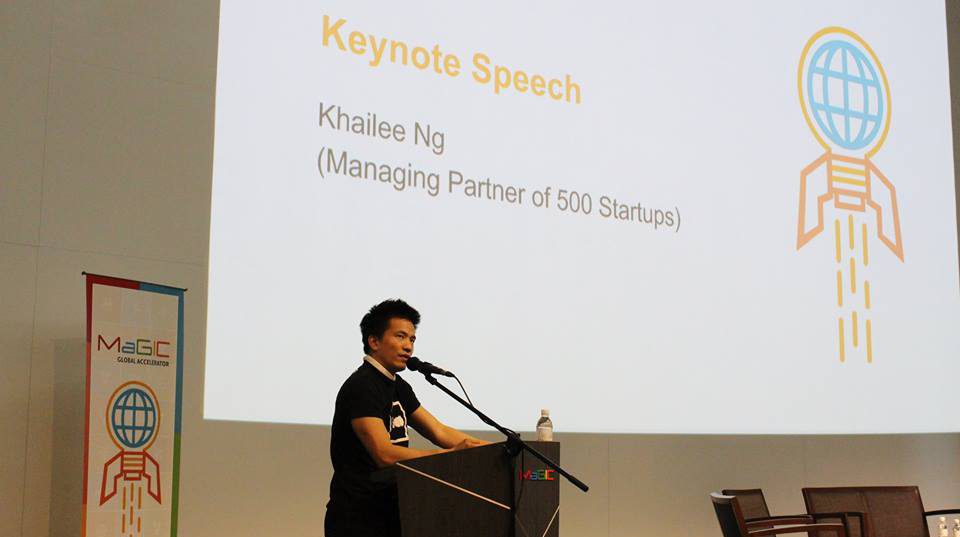“Once upon a time, this tech startup thing was almost a Silicon Valley story. Once upon a time, the billion dollar unicorn was a Silicon Valley story. But we’re at the turning point now, where the power to build tech startups is no longer monopolised by the Silicon Valley narrative.”
“Programs like the Global Accelerator Program here at MaGIC gives you the cross network, the knowledge and connections to funding right here in Malaysia.”
Khailee Ng, Managing Partner at 500 Startups opened his speech with these words at the launch of the new Global Accelerator Program (GAP) yesterday.
GAP has some big boots to fill and a lot of expectations to meet but The Malaysian Global Innovation & Creativity Centre (MaGIC) is ready to rise to the challenge.
First announced by Malaysia Prime Minister Najib Razak during the inaugural Global Entrepreneurship Community (GECommunity) 2016, GAP is the spiritual successor to MaGIC’s Accelerator Program (MAP).
Previous MAP cohort members have seen success in their respective industries, some having even raised up to even RM4 million in funding.
For GAP’s very first cohort, they received 947 applications from 47 countries located in North America, Europe, Africa, and the Middle East.
56 startups (70% from Malaysia, 30% from the other 10 countries) were shortlisted based on three key criteria:
- Prospect to expand in the ASEAN market
- Potential of highly scalable products
- Readiness for early stage investment.
“We are very pleased to have attracted a diverse mix of applicants and received strong interest from around the globe for the inaugural Global Accelerator Program this year,” said Ashran Dato’ Ghazi, MaGIC’s CEO.
For his speech, Khailee Ng was concerned with answering one question: Why do successful people and programs like GAP want to see others succeed?
Here are some of the insights he shared.
1. The world has too many problems and not enough people solving them.
Environmental problems like city smog, social problems of brain drain and lack of jobs when rural folk move to the city—these were some of the examples Khailee gave of issues that had yet to be solved.
Responsible people in power not only recognise that such problems exist, but that more hands have to be brought on deck to help with them. And the only way to bring more people on board is to nurture them from ground up.
2. New technology can even create a whole new economy to revitalise a country.
“Have you heard about how the rich get richer and the poor get poorer? I’m worried about oil-dependent countries.”
“These countries, I think it’s a very scary ten-year projection of where things are going to be, especially if all you have is your traditional economy,” said Khailee.
He then pointed out to countries like the US, where all the top performing companies are now tech companies.
What happens when the largest and most successful companies in a country are tech companies? All the other companies will want to be like them.
“That’s going to inspire SMEs—who are about 60–70% of the local GDP—to use and embrace technology, to turn themselves into startups. 2 to 3 years from now, it’s going to be hard to differentiate a SME from a startup. Everyone’s going to be using software, Big Data, IoT, all those flashy words. And there you have it.”
3. Everyone who has seen some measure of success once had someone else put their faith in them.
“How many of you feel like you’re here because someone gave you a chance once upon a time? Whether it’s a teacher or investor who took a chance on you when you looked like unfundable crap?”
For the same measure of faith that was given, successful entrepreneurs also know they should pour out the same and more.
“We recognise how lucky we are. I hope that when you succeed, you’ll help others along the way. Don’t wait until you’re so rich and so famous that you can finally give back,” said Khailee.
Citing examples from everyday decisions, like who to hire and train, choosing vendors and partners, he added, “There are a lot of people who will be helped along the way because of your success.”
###
“The three things are the reason why I wake up and go to work every day. Sometimes, when you focus too much on your product and the product problem, you lose sight of the big picture of why you’re doing what you do,” Khailee said.
“For we who continue to invest in countries and people that Silicon Valley doesn’t even take notice of, this is really important work. I don’t want a future where we allow just one sliver of humanity to benefit and privilege, I want to see the full spectrum of humanity benefit from this.”
Feature Image Credit: MaGIC













